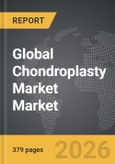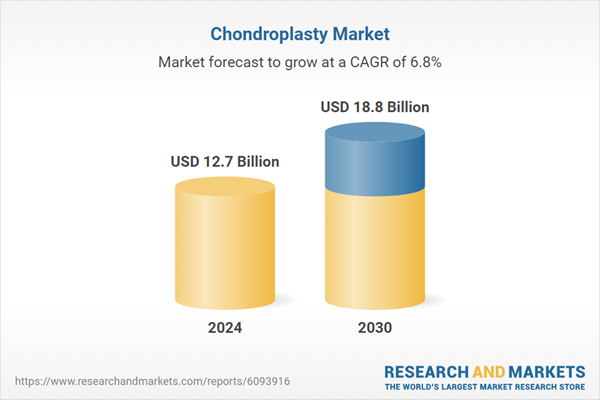Global Chondroplasty Market - Key Trends & Drivers Summarized
Why Is Chondroplasty Gaining Importance in Early-Stage Cartilage Repair, Sports Medicine, and Minimally Invasive Orthopedic Interventions?
Chondroplasty is emerging as a vital orthopedic procedure aimed at preserving and restoring joint function by smoothing or removing damaged articular cartilage. It is particularly relevant in treating early-stage chondral lesions in weight-bearing joints such as the knee, shoulder, and hip. By addressing localized cartilage wear before progression to full-thickness defects or osteoarthritis, chondroplasty supports joint longevity and reduces the likelihood of future joint replacement. As musculoskeletal conditions rise globally due to aging populations, sports-related injuries, and lifestyle factors, the demand for less invasive, joint-preserving solutions like chondroplasty is steadily increasing.This procedure is widely performed via arthroscopy, offering faster recovery, reduced postoperative complications, and minimal scarring compared to open surgery. It plays a critical role in the orthopedic treatment spectrum, often used as a standalone intervention or in conjunction with techniques like microfracture, debridement, or biologic augmentation therapies.
How Are Surgical Techniques, Instrumentation, and Patient Selection Advancing Chondroplasty Outcomes?
Technological innovation is enhancing the precision, safety, and reproducibility of chondroplasty procedures. Advanced arthroscopic shavers, radiofrequency ablation devices, and motorized debriders enable surgeons to selectively remove damaged cartilage without compromising surrounding healthy tissue. Thermal chondroplasty techniques are gaining attention for their ability to coagulate and smooth fibrillated cartilage surfaces while minimizing mechanical disruption.Refinements in imaging - both preoperative (MRI, CT) and intraoperative (arthroscopic visualization) - are improving lesion assessment, procedural planning, and outcome prediction. Patient-specific factors such as lesion size, joint alignment, body mass index, and activity level are increasingly guiding therapeutic decisions, allowing for personalized procedural approaches that enhance long-term joint function.
Post-operative protocols involving physical therapy, activity modification, and adjunctive biologic treatments (e.g., platelet-rich plasma or hyaluronic acid injections) are further contributing to symptom relief and improved joint mechanics, especially in younger and athletically active patients.
Which Patient Demographics, Healthcare Settings, and Regional Markets Are Supporting Chondroplasty Growth?
Chondroplasty is commonly performed in orthopedic hospitals, ambulatory surgical centers, and sports medicine clinics. Patients typically range from middle-aged adults with degenerative joint symptoms to younger individuals experiencing post-traumatic or overuse-related cartilage injuries. Athletes, active professionals, and individuals with early-stage osteoarthritis form the core demand segment for this procedure.North America and Europe lead in procedural volume due to high rates of sports-related injuries, early diagnostic capabilities, and widespread access to arthroscopic surgery. Asia-Pacific is witnessing steady growth as orthopedic infrastructure develops and joint preservation gains traction among urban populations with increasing physical activity levels. In Latin America and the Middle East, growing investments in private healthcare and outpatient surgical capabilities are supporting market expansion, particularly in metropolitan areas.
What Are the Factors Driving Growth in the Chondroplasty Market?
The chondroplasty market is advancing as demand rises for minimally invasive orthopedic procedures that delay or prevent the need for joint replacement. As patients and healthcare providers seek early intervention options that preserve natural joint anatomy and mobility, chondroplasty is increasingly positioned as a frontline cartilage management technique.Key growth drivers include rising prevalence of joint injuries and degenerative cartilage conditions, expanding use of arthroscopy, technological improvements in surgical instrumentation, and a growing emphasis on joint preservation in younger, active patient populations. Cost-effectiveness, short recovery periods, and outpatient procedural efficiency further reinforce its adoption in both public and private healthcare systems.
As healthcare systems prioritize mobility preservation and early orthopedic intervention, could chondroplasty redefine the standard pathway for cartilage repair in active and aging populations alike?
Report Scope
The report analyzes the Chondroplasty market, presented in terms of market value (US$). The analysis covers the key segments and geographic regions outlined below:- Segments: Type (Radiofrequency Ablation Chondroplasty, Abrasion Chondroplasty, Atellar Chondroplasty, Meniscal Repair, Tissue Removal, Other Types); Anatomy Type (Knee, Shoulder, Hip, Other Anatomy Types); End-Use (Hospitals & Orthopedic Clinics, Academic & Research, Other End-Uses).
- Geographic Regions/Countries: World; United States; Canada; Japan; China; Europe (France; Germany; Italy; United Kingdom; Spain; Russia; and Rest of Europe); Asia-Pacific (Australia; India; South Korea; and Rest of Asia-Pacific); Latin America (Argentina; Brazil; Mexico; and Rest of Latin America); Middle East (Iran; Israel; Saudi Arabia; United Arab Emirates; and Rest of Middle East); and Africa.
Key Insights:
- Market Growth: Understand the significant growth trajectory of the Radiofrequency Ablation Chondroplasty segment, which is expected to reach US$5.5 Billion by 2030 with a CAGR of a 8.7%. The Abrasion Chondroplasty segment is also set to grow at 7.6% CAGR over the analysis period.
- Regional Analysis: Gain insights into the U.S. market, valued at $3.4 Billion in 2024, and China, forecasted to grow at an impressive 11% CAGR to reach $4 Billion by 2030. Discover growth trends in other key regions, including Japan, Canada, Germany, and the Asia-Pacific.
Why You Should Buy This Report:
- Detailed Market Analysis: Access a thorough analysis of the Global Chondroplasty Market, covering all major geographic regions and market segments.
- Competitive Insights: Get an overview of the competitive landscape, including the market presence of major players across different geographies.
- Future Trends and Drivers: Understand the key trends and drivers shaping the future of the Global Chondroplasty Market.
- Actionable Insights: Benefit from actionable insights that can help you identify new revenue opportunities and make strategic business decisions.
Key Questions Answered:
- How is the Global Chondroplasty Market expected to evolve by 2030?
- What are the main drivers and restraints affecting the market?
- Which market segments will grow the most over the forecast period?
- How will market shares for different regions and segments change by 2030?
- Who are the leading players in the market, and what are their prospects?
Report Features:
- Comprehensive Market Data: Independent analysis of annual sales and market forecasts in US$ Million from 2024 to 2030.
- In-Depth Regional Analysis: Detailed insights into key markets, including the U.S., China, Japan, Canada, Europe, Asia-Pacific, Latin America, Middle East, and Africa.
- Company Profiles: Coverage of players such as Abbott Laboratories, ACON Laboratories, Inc., Akers Biosciences, Inc., Bio-Rad Laboratories, Inc., DiaSorin S.p.A. and more.
- Complimentary Updates: Receive free report updates for one year to keep you informed of the latest market developments.
Some of the 34 companies featured in this Chondroplasty market report include:
- Arthrex, Inc.
- B. Braun Melsungen AG
- Bioventus LLC
- CONMED Corporation
- DePuy Synthes (Johnson & Johnson)
- Exactech, Inc.
- Geistlich Pharma AG
- GPC Medical Ltd.
- Medtronic plc
- NuOrtho Surgical Inc.
- Organogenesis Holdings Inc.
- Osiris Therapeutics, Inc.
- RTI Surgical Holdings, Inc.
- Stryker Corporation
- Smith & Nephew plc
- Takeda Pharmaceutical Company Limited
- Thermo Fisher Scientific Inc.
- Vericel Corporation
- Wright Medical Group N.V.
- Zimmer Biomet Holdings, Inc.
This edition integrates the latest global trade and economic shifts into comprehensive market analysis. Key updates include:
- Tariff and Trade Impact: Insights into global tariff negotiations across 180+ countries, with analysis of supply chain turbulence, sourcing disruptions, and geographic realignment. Special focus on 2025 as a pivotal year for trade tensions, including updated perspectives on the Trump-era tariffs.
- Adjusted Forecasts and Analytics: Revised global and regional market forecasts through 2030, incorporating tariff effects, economic uncertainty, and structural changes in globalization. Includes historical analysis from 2015 to 2023.
- Strategic Market Dynamics: Evaluation of revised market prospects, regional outlooks, and key economic indicators such as population and urbanization trends.
- Innovation & Technology Trends: Latest developments in product and process innovation, emerging technologies, and key industry drivers shaping the competitive landscape.
- Competitive Intelligence: Updated global market share estimates for 2025, competitive positioning of major players (Strong/Active/Niche/Trivial), and refined focus on leading global brands and core players.
- Expert Insight & Commentary: Strategic analysis from economists, trade experts, and domain specialists to contextualize market shifts and identify emerging opportunities.
Table of Contents
Companies Mentioned (Partial List)
A selection of companies mentioned in this report includes, but is not limited to:
- Arthrex, Inc.
- B. Braun Melsungen AG
- Bioventus LLC
- CONMED Corporation
- DePuy Synthes (Johnson & Johnson)
- Exactech, Inc.
- Geistlich Pharma AG
- GPC Medical Ltd.
- Medtronic plc
- NuOrtho Surgical Inc.
- Organogenesis Holdings Inc.
- Osiris Therapeutics, Inc.
- RTI Surgical Holdings, Inc.
- Stryker Corporation
- Smith & Nephew plc
- Takeda Pharmaceutical Company Limited
- Thermo Fisher Scientific Inc.
- Vericel Corporation
- Wright Medical Group N.V.
- Zimmer Biomet Holdings, Inc.
Table Information
| Report Attribute | Details |
|---|---|
| No. of Pages | 379 |
| Published | February 2026 |
| Forecast Period | 2024 - 2030 |
| Estimated Market Value ( USD | $ 12.7 Billion |
| Forecasted Market Value ( USD | $ 18.8 Billion |
| Compound Annual Growth Rate | 6.8% |
| Regions Covered | Global |









